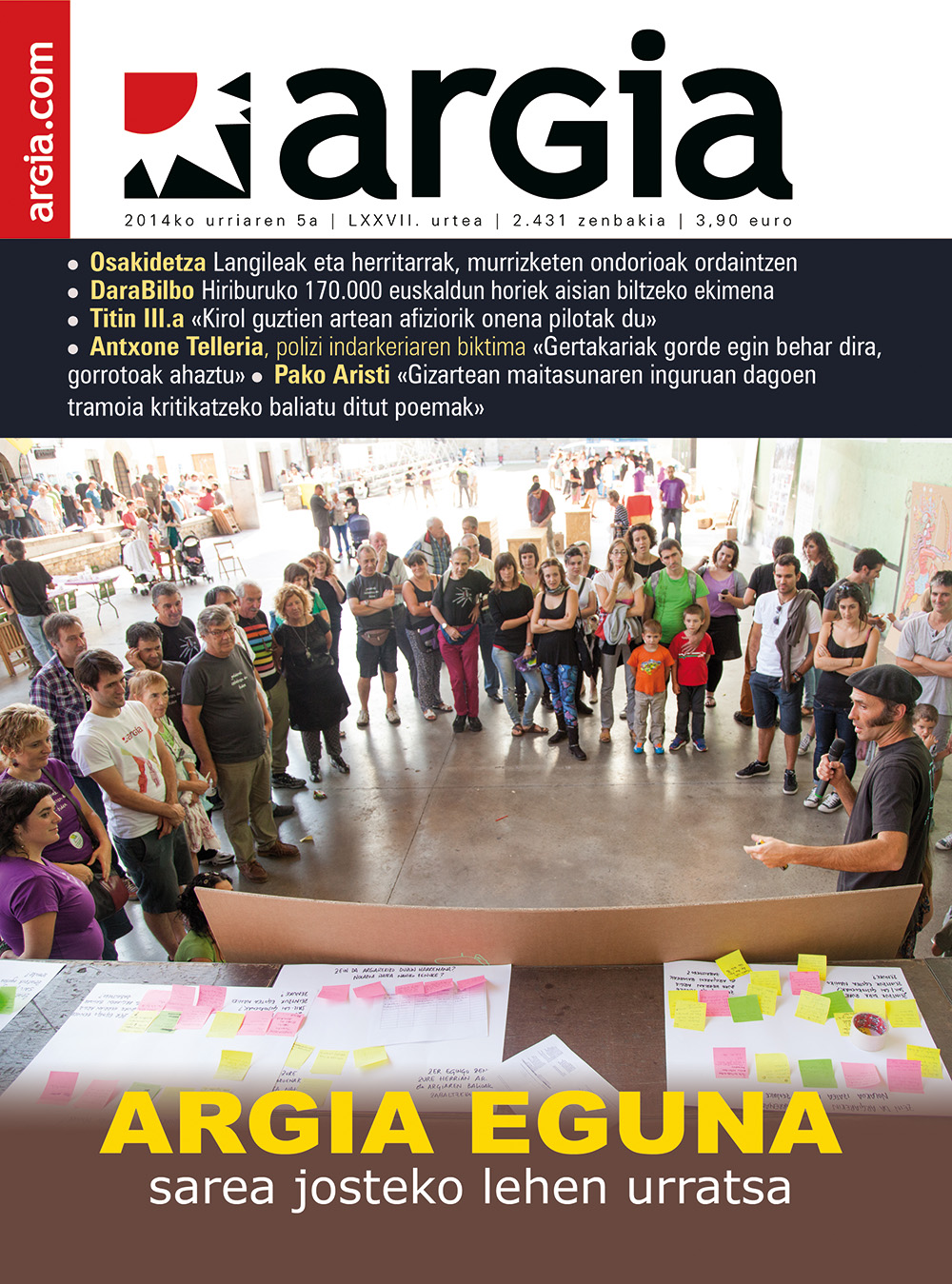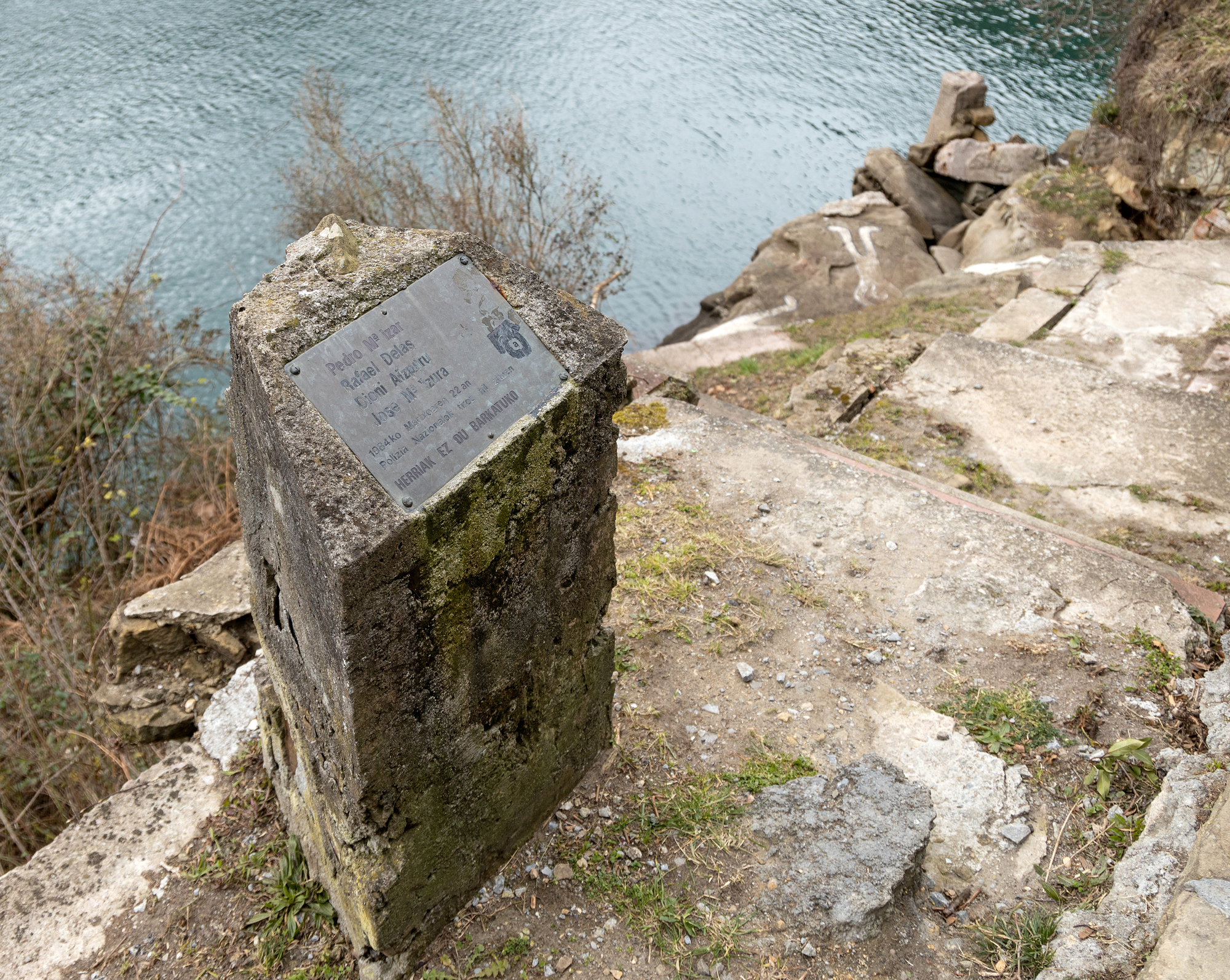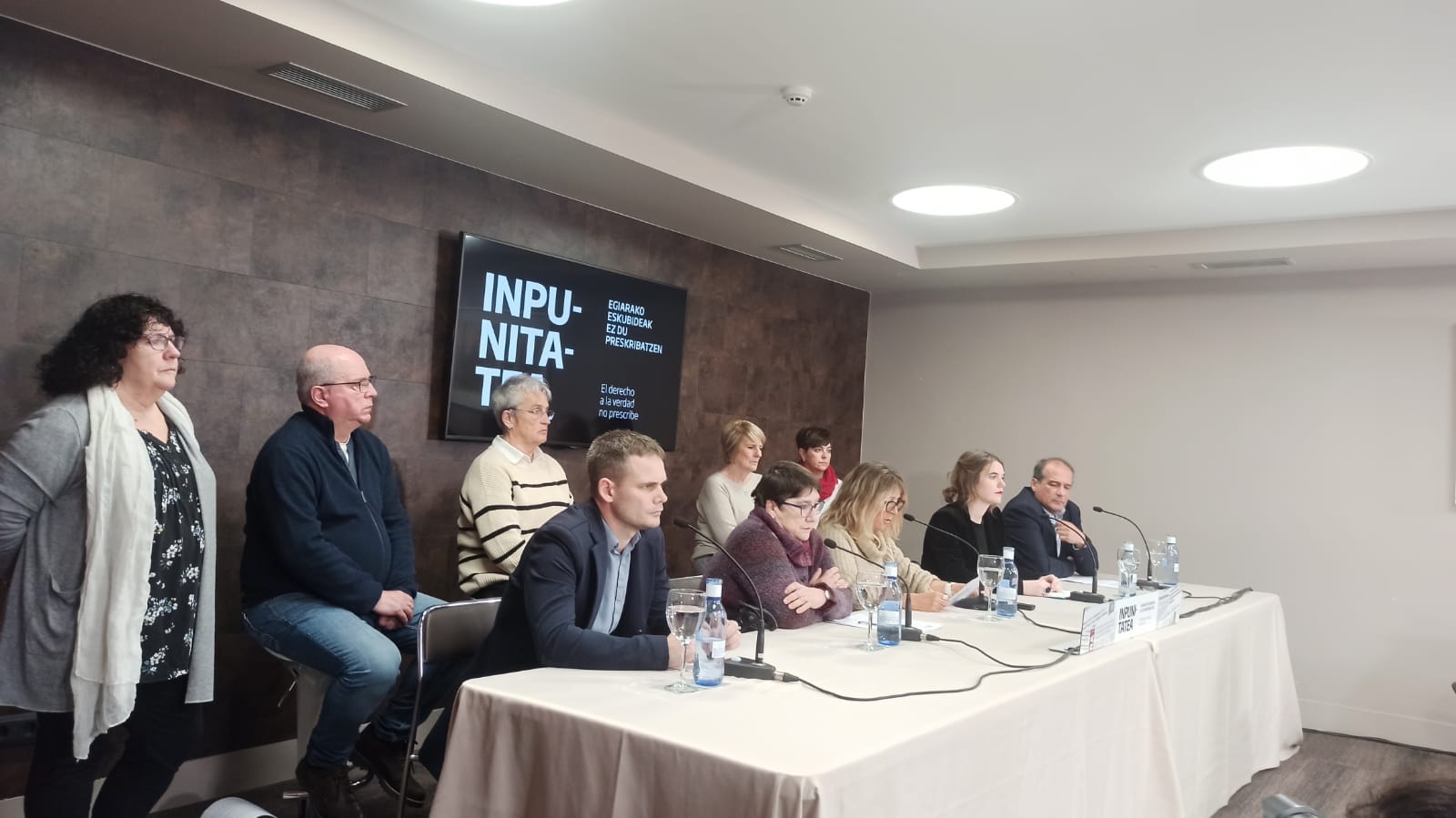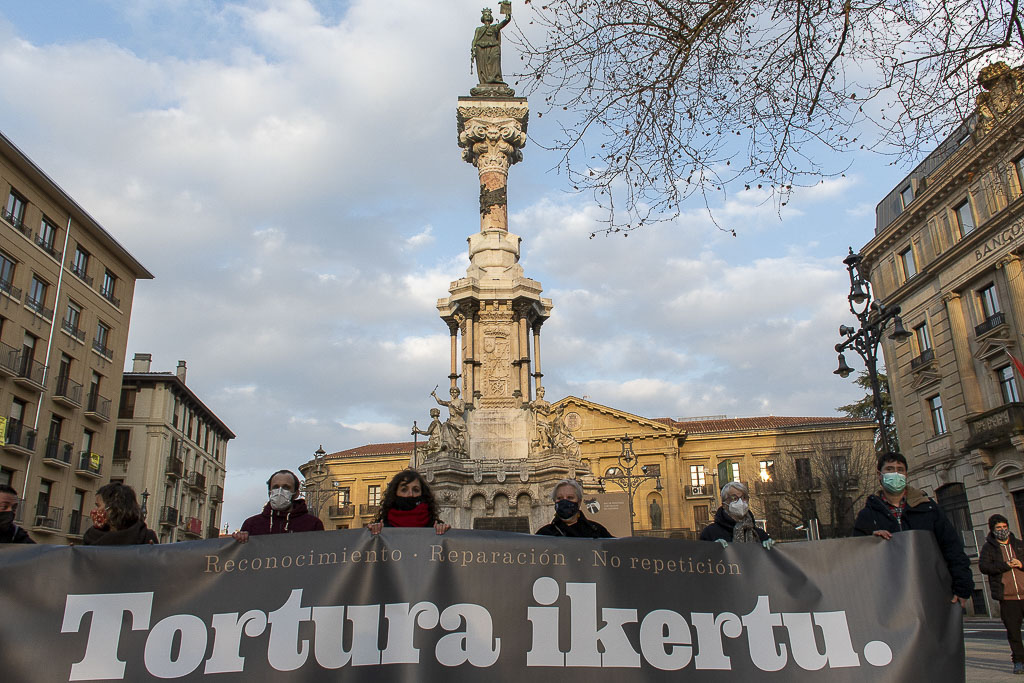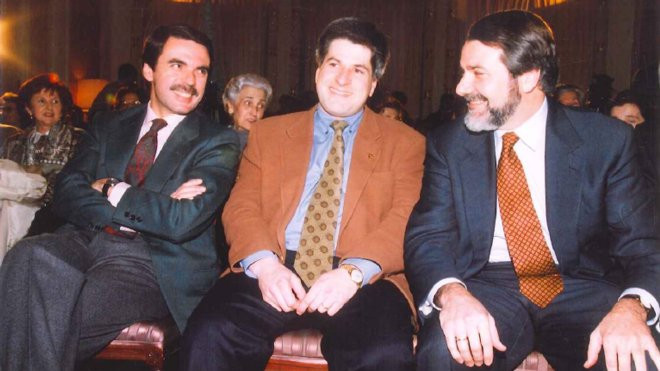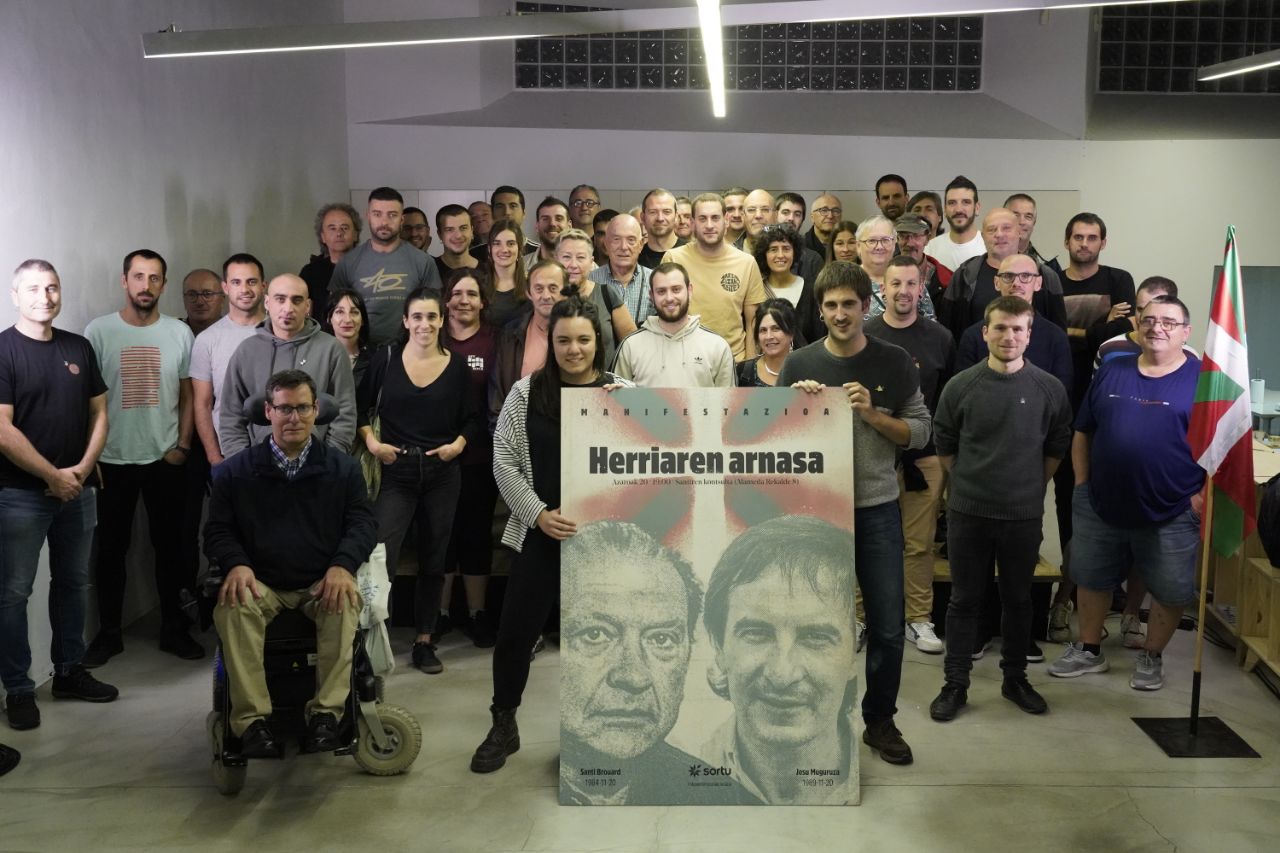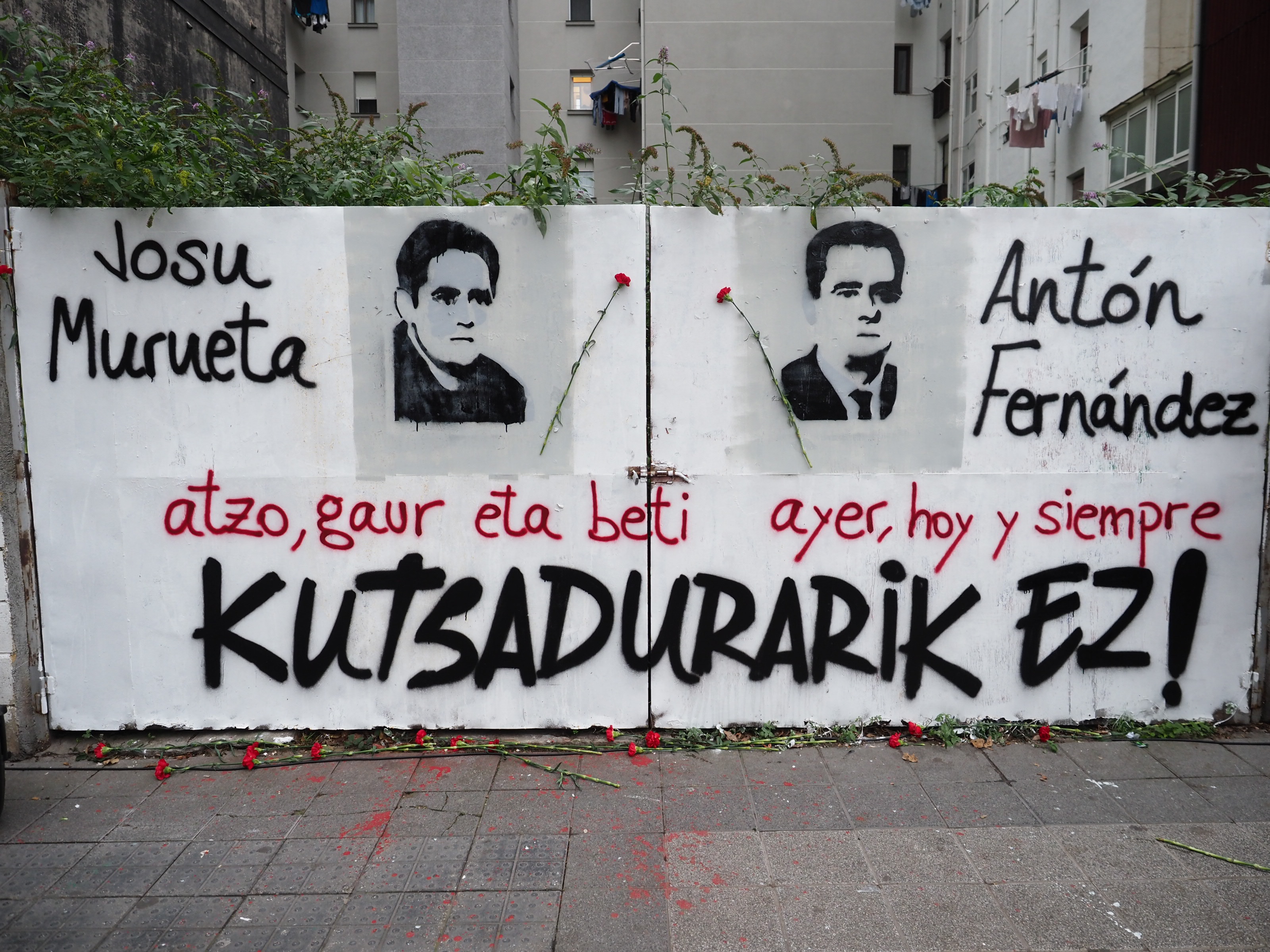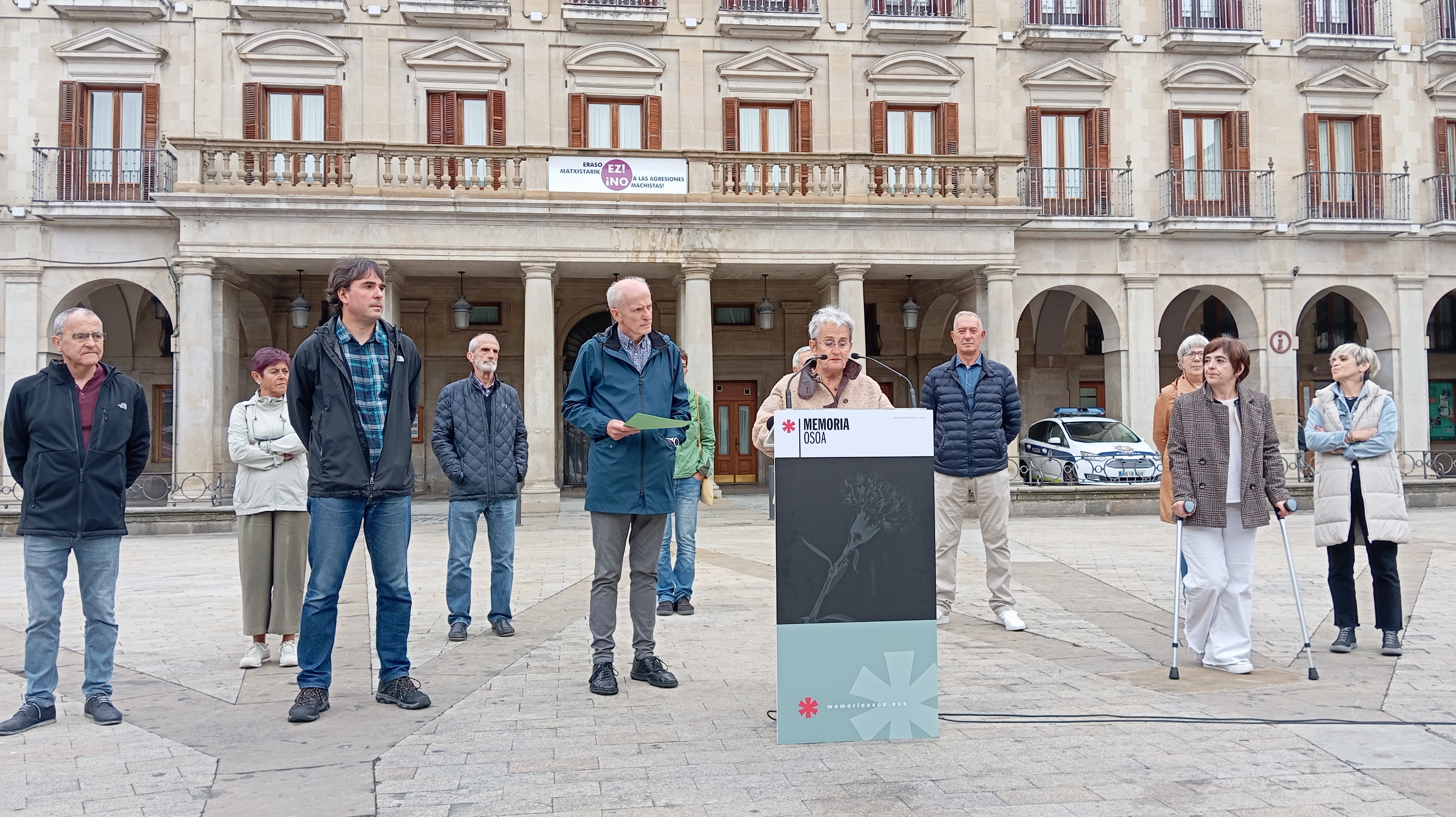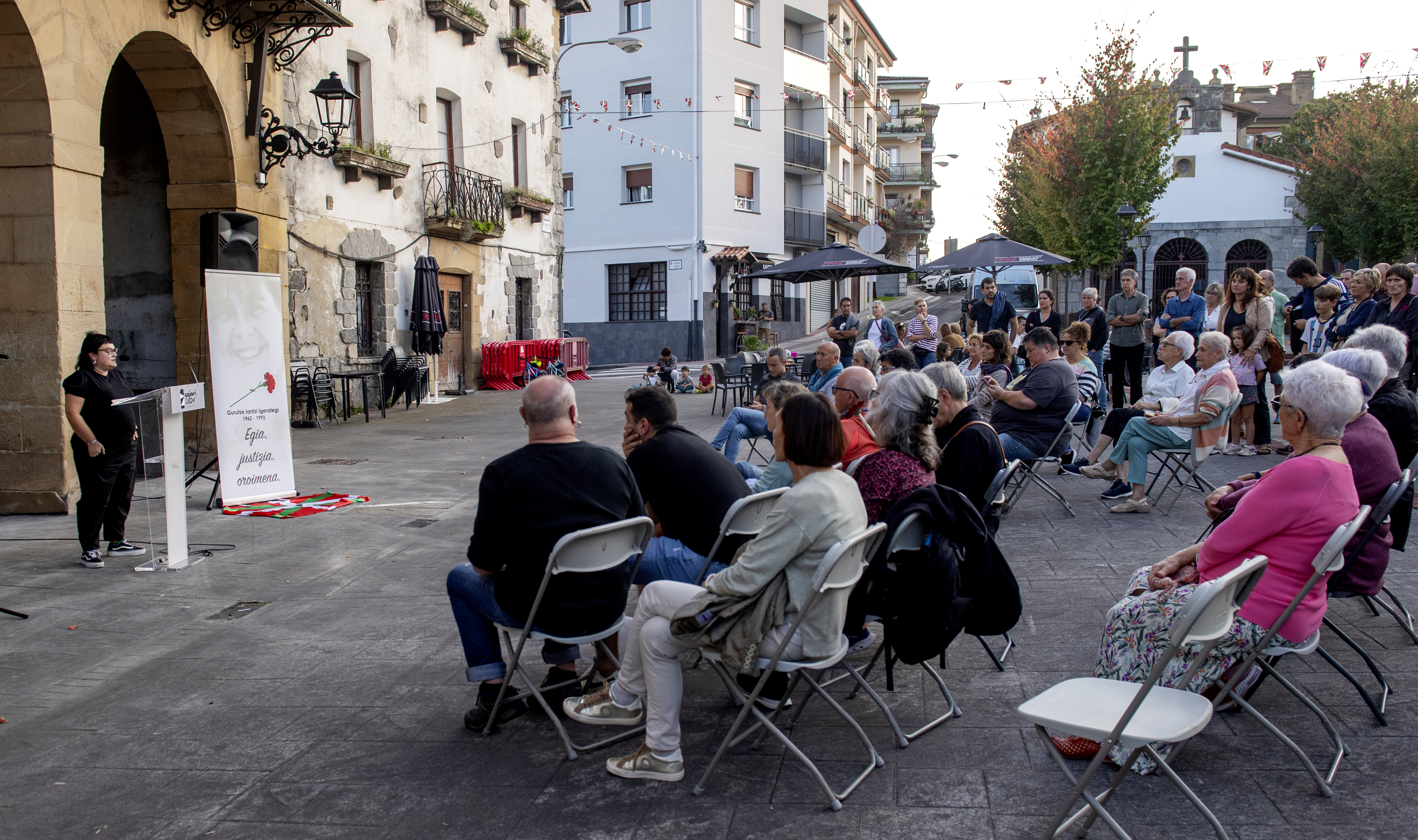"To talk about the victims, we have to talk about the political situation they were in"
- In November 2012, the Basque Government’s Committee for the Assessment of Victims of Unjust Suffering acknowledged the first eight victims of political violence. Between 1960 and 1978, the Government began to repair the victims who suffered in the last hours of the crisis. Of the first eight victims, only one lives: Antxone Telleria Mendia. And where have we been so far?
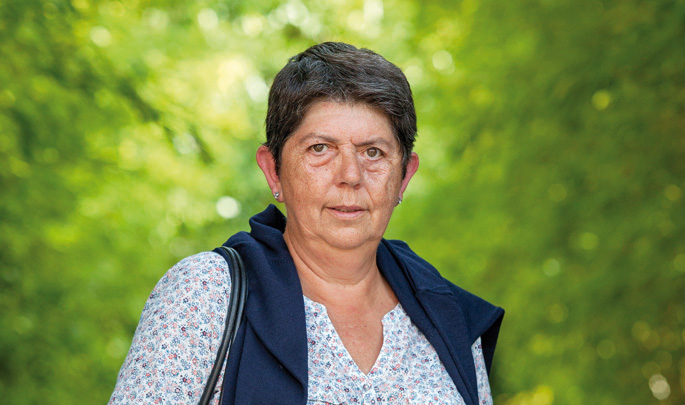
“Antxone Telleria Mendia was seriously injured by the Civil Guard when he evicted the church of Santa Maria de Lekeitio in 1977.” We’ve read it and, at the same time, you don’t remember…
I don't know what happened there every day. I only know what I was told. I still have the memory. The next memory is the one that happened two months later. I have no memory. I know what I've been told a thousand times. Luckily, my sister, my cousins -- there were family people in the church and they remember it. I remember that I was there and that at one point the abate came in and said that it was the civil guards that surrounded the church and entered. The parish priest had just arrived at Lekeitio, Benito Ansola. Next to him came another priest, a young man named Andoni Pérez Urraza. I didn't know him yet, because he lived in Bilbao, because he was studying. We said that to young priests and formed groups to protect them. We had already said that we would not burn it in the church, but the last memory is that everyone was smoking then, and I too… My sister says that I was going ahead of him and when I went out I lost myself as I walked out the door. But I don't remember.
Didn't the civil guards even beat him?
Nothing.
What do doctors say about that memory loss?
It can be a defense mechanism. My head was protected from such an unpleasant thing. Well, I don't know if that's the case, but I know I've had a really bad head. He suffered traumatic brain injury. Doctors say the body organizes its defenses, says “so far!” and it’s already there.
On February 26, 1977, your birthday, lockdown in Lekeitio, week by amnesty…
I remember there were two lockdowns in Lekeitio. One, after Christmas, then in February. Two enclosures one after the other… In February I went out worse, but in Lekeitio there were many wounded, even older people. My sister, for example, got a blow with the head butt. They gave him three or four points, as I learned later. The civil guards made a cart at the exit of the church, in which they played the two sides of one side and the other. I stopped in the car. But I don't remember that. It was a very small barracks, but the four civil guards did not come to the church. They were people from outside. It seems that the people were taken…
What they told you later is they took you first to the Lekeitio Health Center and then to the Cruces Hospital.
A woman in lockdown, Marije Arrinda, realized that the civil guards were being beaten and gave their faces. Then, that woman and the abbot youth-and I mean, brought an ambulance from the Maritime Social Institute near the church. The ambulance was going to leave, but the woman and the priest told her no, she wouldn't go anywhere without them. And the trip to Cruces.
Do you have memories of Cruces?
One day I woke up, looked and saw my sister sleeping on the ground. “What are you doing there?” I said. Caring for you!” “Taking care of me? What's going to happen to me?... You are not there, come to sleep.” But I didn't know where I was. When I started moving to leave her room, she said: “Stay still, you can’t move.” I was tied. I felt so aggressive, I hurt myself. Even literally aggressive. This is the first memory of the hospital. At noon came the mother. “And what happened this morning?” I've seen Josune! And it was he who gave the doctor the alert. “Look, remember today!” I don't remember anymore. However, speaking, it seems that I did a lot.
How long had it been since the civilian guards beat you until you saw your sister in the hospital lying on the ground?
Forty-six days, for example. I don't know. So it was the Intensive Care Unit. There, eight days, for example. Then they took me to neurology. They say I've tired the people there... He next to me had a brain tumor, and they say no one understood him talking. But I didn't know who I was! They say that at all times he said nonsense. I had a cranial fracture, and even to close the fracture, I think I was doped. In addition, I had a clot in my head and I had a headache, but I had to clean it or remove it on his own, things went very quiet…
As I have read, the recovery process took a long time, and there are always the consequences of the civil guards’ beating…
Yeah, they're also there now. But keep in mind that when I left the Cross for the first time, I had my eye one and a half centimeters below. I have it even lower, but then I had it much lower. Everything has its effect. The left side of the face is made with hip bone, removing it from the hip and reconstructing the face. So I was 21 years old, but today I'm 58. The more the owner, the less I care. "Remove the pain! he said. Today, this beating has other consequences that it didn't have at the time. It was more difficult to heal the hip than to heal the face, because making a healthy site was more painful. Conclusions… I have the left eye damaged, both on the outside and inside. If I want to get in bed and watch TV, it's impossible, because I see two screens. I have diplopia. In addition, I have suffered a lot of other damage.
The number of interventions is not very large.
I've never told them. My mother did have the bill. He said to me: “Haven’t you heard of us?” and “No, mother, what for!” At one point I said: “I can’t do more! It doesn’t matter to me!” As long as I'm alive or dead, I'm no longer going to the operating room. On the face, on the left, I have a little paralysis that always told me the same thing. “Get your eye right… You’re still young… You’re going to stay better.” For Popa! When ten or more years passed, I said “enough is enough.” There was always something. In one, in the other, then in the next… The question was not “this we will do and we will finish it”. No. Moving the eye to its place was a very long process: surgical interventions, infections, this and the other…
In 1977, there were studies of Teaching in Derio…
It happened to me in February and by then we had completed the tests of the first four-month period. Then, teaching practices had to be done. In that course, I had a couple of pending subjects and I also had to do internships. The next year, I started working, and with permits, I finished my studies while I was working. Otherwise, there, in June of the year, I knew exactly what Antxone Telleria was. I didn't know much more!
I have read in Basque “Victim of political violence”. In Spanish, “victim of police violence”. There is also the problem. Political and police, you do not like the title of victim, as I have read.
It's true, I don't like it. I don't like the word, neither when they talk about me, nor about other victims. The victim, in fact, is the person who died. Their relatives are collateral. I think the word victim has little connotation. It has negative political connotations. I believe that this word has been used and that some have managed their lives very well. Victim? No.
What do you think of the meetings held by the victims?
I think it is to be applauded. I admire the people who have participated in these meetings. The reasoning capacity you've had! If you proposed it to me, I don't know if I would be able. I think yes, I would participate, but depending on the depth of pain and people. I believe that with some people we cannot make progress. For example, it is noted that the meetings held in Ireland took place in a very positive atmosphere. However, many people are poisoned, cannot accept the pain of others. “You have a bad time, sweetheart… The godfather, the mother, the brother or whatever they are going to die, but others have also been passed on. You are not the only one in the world!” As long as you don't admit it, I can't talk to those people. It would cost me a lot.
They also opened another line, or the politicians wanted to open: exposing their own testimony in the educational centers. You are a professor, what do you think of it?
Neither have I been asked in my school. I think there are things to be forgotten. Telling the testimonies and that, I don't know how much a 14-year-old cares about what happened to me. I didn't have children, but my parents' house was very big, and there were my sister, her children and everyone. At one time, I realized that the issue never came out, that the young people of that age did a “we have not known”. They didn't want to know anything that distinguished them. They have other interests and I don't know if they can understand them. I think that to talk about the victims we have to talk about the political situation in which they lived. Talk to colleagues – let us say victims – well, when the doors are open. If not, when you leave and the orphans touch you… “The Basques are bad… Because the Basques… And what do you think about this?”… “If your father has been killed, what will I say to you? Maybe it wasn't. I understand your pain.” But if you can't see anywhere else, we're not the only people we've suffered in this world, I don't know.
You are among the top eight victims of political violence.
The first. Those approved by the Basque Government, not those of Spain. On the contrary, surely the Spanish Government was going to prosecute us in order not to recognize ourselves as a victim. But the compensation was ridiculous, the same scale was applied to compensate those who hurt or die in a traffic accident. We have not received recognition from many other victims. Neither political nor economic recognition. And the worst thing they want is to take it away! After us, other victims are also waiting to be recognized, but there are the Spanish police union, AVT, COVITE and others, against. The process is paralysed until it is moved to Strasbourg.
From the time the civil guard touched you for many years until the Basque Government acknowledges your pain…
Many years, yes. Once, I remember very angry. A long time ago campaign by the Basque Government for the victims. There was a bullet. And I wrote to the government. “They have their pain, but we at home have our own mincho.” Answer? “Yes, you’re right, but you’re going to jail.”
“Are you going to jail?”
Here we say among ourselves: “You’re right, but that doesn’t work at all.”
Have you ever received the support of the other institutions? City Hall of Lekeitio, Diputación de Bizkaia…
The protection that people give. I told her that my mother had taken care of everything in the beginning. When they gave him the first bill at the hospital in Cruces… I was going to the hairdresser to do the permanent one, but I think that day he was left with the permanent one forever, seeing that bill. The mother made arrangements here and there. We lived in Lekeitio, but we also had to be in Bilbao, in the hospital, and that meant expenses that nobody expected. He addressed the City Hall, and not the mayor, but a councilor, who answered: “If your daughter had been at home, like mine, nothing would have happened to her.” He had recovered forever. I hated him all my life. Here's the official answer. “If he had been home, nothing would have happened to him.”
On that list of the top eight confessed victims, several names, completely forgotten. Now it is the Memory Institute in the Parliament of Gasteiz…
I think you have to keep all things, they're parts of the story. Data, incidents, etc. must be stored. Forget about hate.
Antxone Telleria Mendia (Lekeitio, 1956). Irakasle ikasketak ditu eginak Derion (Bizkaia), eta Lekeitioko R.M. Azkue ikastolan da irakasle. Ikasketak amaitzen ari zela, 1977ko otsailaren 26an, 21 urte betetzen zituen egunean, Lekeitioko Santa Maria elizan zen, amnistiaren aldeko itxialdian. Guardia zibilek eliza hustu eta larri zauritu zuten. Orain bi urte, indarkeria politikoaren biktimatzat jo zuen Eusko Jaurlaritzak, Angel Otaegi, “Txiki”, Antonio Fernandez Elorriaga, Francisco Javier Nuñez Fernandez, Segundo Urteaga Perez de Unzueta, Francisco Javier Batarrita Elexpuru eta Alberto Soliño Mazachs-ekin batera. Biktima askoren artean, zortzi.
“Indemnizazioa eman zidaten, behin, eta behin betikoa da. Hala ere, trafiko istripua izan duenaren baremoa eduki dut. Ez gara beste biktima batzuen mailakoak. Euskal gobernuak errekonozitu gaitu. Kostatu zaio, horratik!, etxean zer daukan konturatzea, baina egin zuen, behintzat. Espainiako gobernuak ez du horrelakorik egin. Gatazkan alde bat baino gehiago dagoela ez du onartzen. Balantza ez dago orekatuta, alderantziz, oso desorekatuta baino. Horrek guztiak pentsarazi egiten dizu”.
“Gure ama hil zen, baina jaso nuen errekonozimendu ekitaldian egon izan balitz, uste dut bertan egunean hilko zela, pozik. Baita aita ere. Banuen amama bat, laurogeitaka urte edukiko zituen, eta bertan urtean, Gabonetan, karpeta bat oparitu zidan: egunkari guztietako ebaki guztiak zeuzkan hantxe gordeta. Esan zidan: ‘Atera horixe, gaur egunean egiten dena, fotokopia. Atera eta gorde, ze hau da zure historiaren partea!’. Batzuetan kostatu egin zait honetaz berba egitea, mina, sufrimendua, ernegua ekartzen dituelako gogora”.
“21 urte dituzula ez zaizu gustatzen besteetatik ezberdina izatea, eta Antzar Eguna zure lagunak antzarak disfrutatzera joatea eta ni, aldiz, kirofanora, mahoizko jantzita!”.
Espainiako Poliziak duela 41 urte hil zituen tiroka Dionisio Aizpuru, Pedro Mari Isart, Jose Mari Izura eta Rafael Delas gazteak, Komando Autonomo Antikapitalistetako kideak.
GALeko biktima talde batek eman du kereilaren nondik norakoen berri Bilbon egindako prentsaurrekoan, Egiari Zor fundazioak eta Giza Eskubideen Euskal Herriko Behatokiak lagunduta. GALen aurkako eta, zehazki, José Barrionuevoren aurkako kereila aurkeztuko dute.
Nafarroako Gobernuak ofizialki aitortu ditu gure lurraldean giza eskubideen urraketa larriak jasan zituzten Estatuaren indarkeriaren beste zazpi biktima. Horien artean, hitzez hitz “motibazio politikoko biktima gisa” aitortzen ditu Patxi Erdozain, Eneko Compains,... [+]









